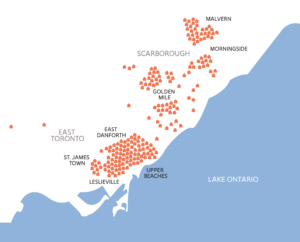Housing, Spotlight on partners
January 31, 2024
Circle Community LandTrust: a new model to preserve public housing
Circle Community LandTrust: a new model to preserve public housing
January 2024
June 1, 2022, was a historic day for Circle Community LandTrust. It was the date the non-profit took ownership of the first of more than 600 homes from the City of Toronto and introduced a replicable new Canadian housing model that guarantees publicly owned units will remain affordable and accessible for existing and future tenants.
Circle’s genesis lay in the Toronto Community Housing Corporation’s 2011 announcement they would sell approximately 900 scattered homes from their enormous property portfolio. Fearing the transfer of these public units to the private sector, tenants and housing activists put pressure on the local government to reverse the proposed sales and began to search for alternative solutions.
 At the time, existing housing non-profits and co-ops in Toronto only had the resources to manage a few dozen houses and a scattered-housing specialist organization who could preserve and manage hundreds of houses didn’t exist. Circle Community LandTrust, a new tenant-focused organization centred on the right to housing and committed to preserving affordable units, would be created to fill that gap.
At the time, existing housing non-profits and co-ops in Toronto only had the resources to manage a few dozen houses and a scattered-housing specialist organization who could preserve and manage hundreds of houses didn’t exist. Circle Community LandTrust, a new tenant-focused organization centred on the right to housing and committed to preserving affordable units, would be created to fill that gap.
“There was the threat of tenants losing their homes, but the other threat was the loss of this irreplaceable housing stock,” says Joy Connelly, a housing rights advocate and consultant who helped found Circle. “These houses were bought for an average of $36,000 apiece and you can’t replace them today. They’re among the last family-sized affordable housing in the city.”
Connelly began to work with an advisory team with the necessary experience to navigate the coming challenges with government and lenders and in 2020 they presented a formal proposal to the City of Toronto that defined how the new organization would assume the housing – from financing and repairing derelict homes to staffing – and how they would operate.
 In 2021, the City accepted that offer, and Circle began to build an organization from scratch. (The Catherine Donnelly Foundation was an initial funder of that process.) On the first week of the following year – six months prior to taking possession of the houses – Circle CEO Alia Abaya began work as employee number one.
In 2021, the City accepted that offer, and Circle began to build an organization from scratch. (The Catherine Donnelly Foundation was an initial funder of that process.) On the first week of the following year – six months prior to taking possession of the houses – Circle CEO Alia Abaya began work as employee number one.
“It was really hitting the ground running,” says Abaya. “You’re simultaneously building the organization from scratch – hiring everybody and getting our systems running – and working really closely with Toronto Community Housing and the City on the actual transfer.”
With the countdown to the transfer begun, Circle asked themselves how they would be the best landlords and service providers for tenants. Among the first people the Circle hired were a tenant engagement coordinator and a tenant experience coordinator. A Tenant Advisory Group also provides insight and feedback that informs decision making at the organization.
The initial vision for Circle was to be a leader in scattered housing from a property management and tenant services perspective; what they didn’t foresee was also becoming experts in the transfer process.
“People were really excited by the opportunity to save the houses while preserving mixed-income neighborhoods and [undertaking] energy retrofits on the properties. The city was incredible, TCH was incredible and, of course, our lenders were there,” says Abaya. “[This work] touches on key issues like housing, environmental sustainability, social economic, diversity, and mobility. There’s something for everyone to stand behind and support, which makes it a really moving story.”
Abaya believes the process is replicable and is especially hopeful because of the true spirit of collaboration evident in the process. “Sometimes you hear criticism of specific groups, when people are trying to push agendas forward,” says Abaya. “But my experience [of] the transfer and the whole lead up, was nothing but hands-on deck from all parties and it really shows you can have effective cross-sector partnership.”
Joy Connelly flags another essential component of Circle’s story: the value of public housing.
“Part of the lesson learned is the value of non-profit or public ownership of housing. These houses would not have been available if the City of Toronto had not been acquiring houses in the 70s,” notes Connelly. “Housing that was once affordable no longer is, so [this process] really honors the city and the value of taking housing out of the market sector and making it a public good.”
To read more about Circle Community LandTrust and the transfer of housing from Toronto Community Housing, visit Circle’s website.
